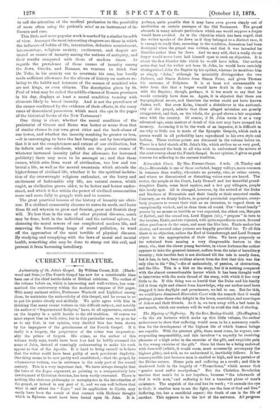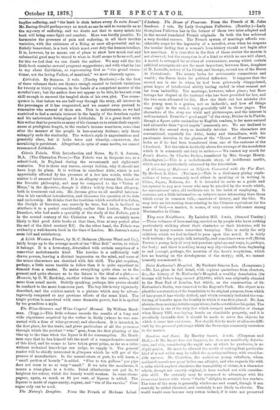The Mystery of Suffering. By the Rev. Baring-Gould. (Skeffington.) —In
the six lectures which make up this little volume, the author endeavours to show that suffering would seem to be a necessary condi- tion for the development of the highest life of which human beings are capable. With the greatest gifts, there must come, he argues, cor- responding responsibility, and this involves "a capacity for receiving pleasure of a high order in the exercise of the gift, and exquisite pain in the wrong exercise of the gift." Once let there be a being endowed with free-will (which, it would seem, must necessarily accompany the highest gifts), and evil, as we understand it, inevitably follows. It be- comes possible just because man is exalted BO high, and is a partaker of the Divine nature. Hence pain and suffering as a result ; and this is shadowed forth in the tragedy of "Prometheus," which means that "genius must suffer martyrdom." But the Christian Revelation teaches that man's lot is not hopeless, because "the tabernacle of God is with men," and suffering is but a transient phase of man's existence. The anguish of the soul has its work ; "it unseals the eye to God; it enables man to see the light, see the face of God and live." Suffering, too, has a sacrificial aspect; the death of one is the life of another. This appears to be the law of the universe. All progress implies suffering, and "the lamb is slain before every In eritu Israel." Mr. Baring-Gould perhaps says as much as can be said to reconcile na to the mystery of suffering, and we doubt not that to many minds his
book will bring some light and comfort. More was hardly possible. To harmonise the presence of pain and suffering, in all their terrible varieties, with the existence of a Being at once all-powerful and in- finitely benevolent, is a task which must ever defy the human intellect. It is, however, by no means out of place to show how much real and substantial good may be traced to what in itself seems to be an evil, and for this we feel that we can thank the author. We may add that his little book contains several pregnant suggestions; and with what he has to Bay about Calvinism, as representing God as "the grand execu- tioner, not the loving Father, of mankind," we most sincerely agree.



































 Previous page
Previous page